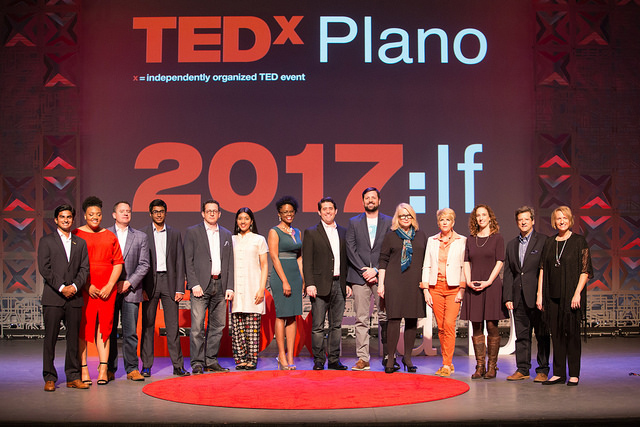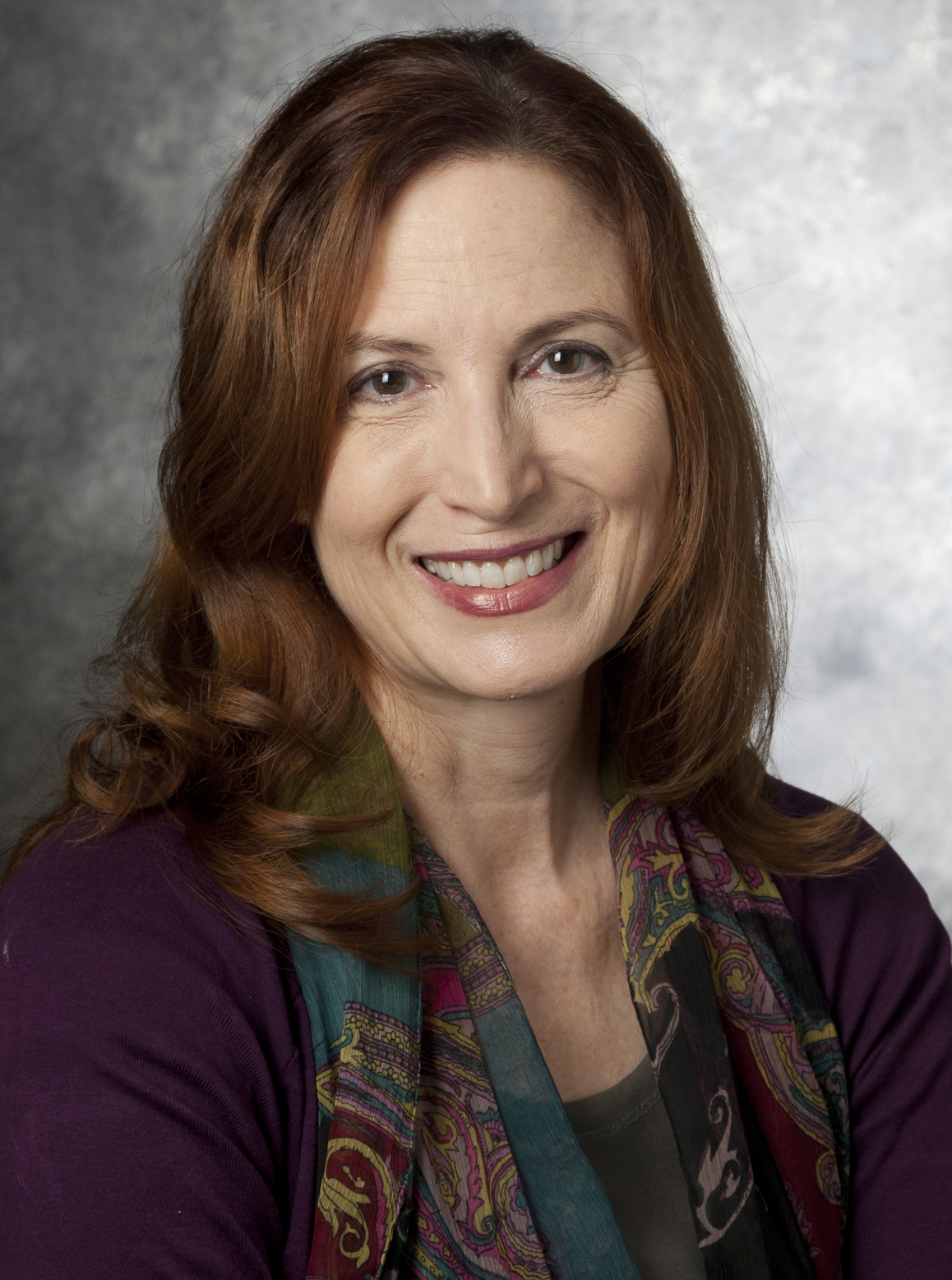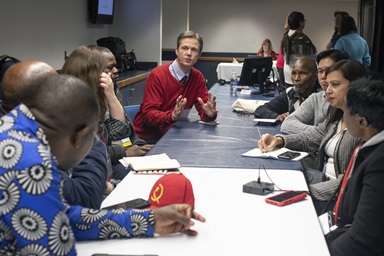The Rev. Arthur Jones is a fan of TED Talks. While he’s adamant that they’re no substitute for sharing the gospel, he’s just as sure that preachers can learn from them.
“TED Talks are the closest analogy to preaching in the secular world,” said Jones, associate pastor of St. Andrew United Methodist Church in Plano, Texas. “They’re a great source of ideas, content and presentation style.”
TED Talks — the acronym stands for Technology, Entertainment and Design — have found their way into United Methodist life. The talks influence preachers and are shown in a variety of church settings to spark discussion.

The Rev. Arthur Jones (center) of St. Andrew United Methodist Church poses with other speakers at an April TEDx event in Plano, Texas. Photo courtesy TEDxPlano.
The talks are video-recorded in front of live audiences and shared worldwide through the Internet. They’re typically brief (about 18 minutes), anecdotal and focused on a single idea about which the speaker feels passionately.
Renowned figures across a range of professions and academic disciplines have given TED Talks. Pope Francis gave one in April titled “Why the Only Future Worth Building Includes Everyone.”
The all-time most popular TED Talk, “Do Schools Kill Creativity?” by educator and author Ken Robinson, has had more than 46 million views.
The Rev. Donnie Wilkinson is among United Methodists who qualify as “TEDheads” or “TEDsters” — regular viewers of the talks.
“I schedule time in my week to watch at least one,” said Wilkinson, pastor of Broadmoor United Methodist Church in Baton Rouge, Louisiana. “I do it so I can stay informed, and just to stretch my mind and think thoughts I’ve never thought before.”
TED Talks began in 1984 in Monterrey, California, at a conference organized by architect Richard Saul Wurman. He wanted to highlight the convergence of technology, entertainment and design.
That event lost money, but Wurman and a partner were more successful in 1990. After that the Monterrey conferences became annual.
Chris Anderson’s Sapling Foundation acquired TED in 2001, and the range of topics broadened. Five years later, TED began posting the conference talks online, for free.
By 2012, TED Talks had been viewed more than 1 billion times.
Taking a Cue from TED
The Internet does not lack for lists of lessons pastors can learn from TED Talks. Among them:
- 10 Things Pastors Should Learn from TED Talks
- 7 TED Talks That Will Make You a Better Preacher
- 12 Things TEDx Speakers Do that Preachers Don’t
And TED, not to be outdone, offers its own playlist of TED Talks about public speaking.
These days there’s a TED Radio Hour, as well as a range of TED conferences and local TEDx events. There are TED books, and Anderson has written a best-selling guide to public speaking based on TED Talk principles.
Some writers have described the phenomenon as a high-tech throwback to the U.S.’s Lyceum and (Methodist-founded) Chautauqua speaking traditions. But never before has such a vast library of oratory been so easily accessed.
Here and there, United Methodist churches are taking advantage, using TED Talks in small group settings.
At Trinity United Methodist Church in Columbus, Ohio, the Rev. Katy Wheat and intern Tyler Norris are overseeing a summer “Trinity TED Talks” class.
Class members choose a talk to watch and discuss, from a list of about 70 that Wheat previewed.
“I made it clear that this is for talking about faith, and for how faith and this seemingly secular subject connects to faith,” Wheat said.
The class replaces one that featured book discussion. Wheat said the book class tended to be 80 percent talking by the leader, and 20 percent by the class. The TED Talk discussion reverses the numbers.
“It’s a phenomenal resource,” Wheat said of the TED Talks backlist. “I would encourage colleagues to avail themselves of it.”
First United Methodist Church of Fort Worth, Texas, has lately mixed showing TED Talks, such as Elizabeth Gilbert’s “Your Elusive Creative Genius,” with TED Talk-like presentations from people in the community about such issues as domestic violence.
The Rev. Tom McDermott, associate pastor, said the goal with the “First Talks” class is to open up the church to the community as a place of discussion about issues, something he and other church leaders feel is important in a divisive time.
Charme Robarts, the staff member who oversees the class, sees spiritual value even when the discussion remains secular.

The Rev. Alyce McKenzie, who teaches preaching at Southern Methodist University’s Perkins School of Theology, is among those who believe preachers can learn from TED Talks. Photo courtesy Perkins School of Theology.
“The things we’re learning together, the things we learn to care about, directly affect who we are as people of faith,” she said.
United Methodist annual conferences and church agencies also are making use of TED Talks.
The Rev. Junius Dotson, top executive of Discipleship Ministries, is leading a “See All the People” campaign to encourage discipleship-making among local churches, and in his guidebook for doing that he touts Simon Sinek’s TED Talk “How Great Leaders Inspire Action.”
The Louisiana Conference used the Sinek talk, Brené Brown’s “The Power of Vulnerability” and two others to spark group discussion at its annual gathering a few years back, said Wilkinson, the Baton Rouge pastor.
The Upper New York Conference has used the talks as models for study in its Illuminate Preaching Academy.
“They’re very concise, very tight, and they deliver the information well, just like a sermon should,” said the Rev. Aaron Bouwens, conference director of vital congregations.
TED Talks also have influenced seminary discussion of preaching, said the Rev. Alyce McKenzie, Le Van Professor of Preaching and Worship at Southern Methodist University’s Perkins School of Theology.
McKenzie, a United Methodist elder, is careful to note that Christian sermons, unlike TED Talks, are given in a particular local context, for an overarching reason.
“The purpose of preaching is to proclaim what God has done for us in Jesus Christ,” she said.
Still, McKenzie too thinks preachers can learn from the best TED Talks. She boils the lessons down: “Be clear. Be interesting. Be vivid. Waste no words. And then sit down.”
Various United Methodist pastors have quoted TED Talks in sermons, or shown clips. Jones, the Plano associate pastor, is the rare United Methodist clergyman to give a TED Talk.
He spoke at a TEDx event in Plano on April 8. The audience members included his father, Texas Conference Bishop Scott Jones.
TED Talks tend to be bold, and the associate pastor’s was, beginning with the title: “How to Change the World.” He argued in just under nine minutes that social and political change doesn’t occur from people spending time on the Internet, even if they’re discussing serious matters.
“My TED Talk was actually about the pointlessness of sharing ideas without community to actually implement and live into the ideas that are expressed. Which is in fact a critique of TED Talks,” Jones said.
Hodges, a United Methodist News Service writer, lives in Dallas. Contact him at (615) 742-5470 or [email protected]
Like what you're reading? Support the ministry of UM News! Your support ensures the latest denominational news, dynamic stories and informative articles will continue to connect our global community. Make a tax-deductible donation at ResourceUMC.org/GiveUMCom.




